“The planet is witnessing the appearance of new creatures, ones that have already conquered all continents. At first glance, they seem very delicate and frail but this is an illusion – they are long-lived, almost indestructible: their fleeting bodies won’t decompose for some three hundred more years.
These plastic bags are empty on the inside, and this historic foregoing of all contents unexpectedly affords them great evolutionary benefits”
( Olga Tokarczuk in Flights – Man Booker International 2018)
 Plastic has proven to be indispensable in our global economy; most is used as packing material. Despite the fact that over 13 million tons of plastic are annually dumped into our oceans – every minute a truckload – the global production of plastic is still on the increase.
Plastic has proven to be indispensable in our global economy; most is used as packing material. Despite the fact that over 13 million tons of plastic are annually dumped into our oceans – every minute a truckload – the global production of plastic is still on the increase.
 In Europe circa 30% of plastic is recycled.
In Europe circa 30% of plastic is recycled.
If it is up to the Portuguese Parliament plastic bags – as well as plastic packing material for fruit, vegetables and bread – will be forbidden from June 2020.
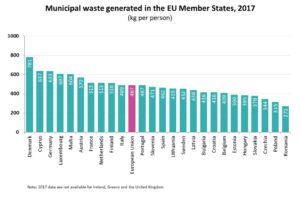 Every Portuguese citizen produces about 480 kg of garbage per year (~ 1,3 kg per day), just as much as the average European. However, the separate collection of paper, glass and plastic in Portugal is still very limited and only 10-15% recycled.
Every Portuguese citizen produces about 480 kg of garbage per year (~ 1,3 kg per day), just as much as the average European. However, the separate collection of paper, glass and plastic in Portugal is still very limited and only 10-15% recycled.
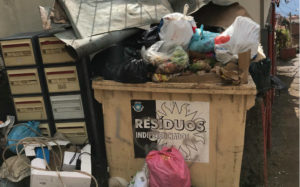 Since the tourist boom some seven years ago, urban waste production in the capital has nearly doubled. Especially downtown – Cais do Sodré, Misericórdia and Bairro Alto, where most tourists stay and the nightlife takes place – garbage accumulates. It leaves no doubt that – besides separation of waste – the frequency of collection services has to be intensified.
Since the tourist boom some seven years ago, urban waste production in the capital has nearly doubled. Especially downtown – Cais do Sodré, Misericórdia and Bairro Alto, where most tourists stay and the nightlife takes place – garbage accumulates. It leaves no doubt that – besides separation of waste – the frequency of collection services has to be intensified.
Another major polluter is the textile industry, the second largest after the oil industry. Although one can nowadays buy a T-shirt and a pair of jeans for almost no money, few people realize the enormous footprint – of nearly 15.000 litres of water – it takes to produce them. The manufactory of clothing has doubled in the last 15 years, whereas its lifespan was halved. Fast fashion rules!
 Each year the Portuguese throw away 200,000 tons of textile (~20 kg per person). Although in some places – e.g. Braga –selective collection of textile takes place, the majority of unwanted clothes end up in the incinerator or on the garbage dump.
Each year the Portuguese throw away 200,000 tons of textile (~20 kg per person). Although in some places – e.g. Braga –selective collection of textile takes place, the majority of unwanted clothes end up in the incinerator or on the garbage dump.
Bom fim de semana Enjoy the weekend (pics Sapo/DN/Público)


 Back in 1998, the now 84-year-old artist created a series of paintings –
Back in 1998, the now 84-year-old artist created a series of paintings –  It lasted until 2007 before this mistake was corrected and abortion laws in Portugal were liberalized.
It lasted until 2007 before this mistake was corrected and abortion laws in Portugal were liberalized. The exhibition Paula Rego: Obedience and Defiance’ will be the first major retrospective of her work since the 1960s. To support the exhibition – that opens on 15 June at MK Gallery in Milton Keynes, UK – the artist has offered a limited edition print from her celebrated series hoping the etching Untitled Abortion, 2000 will help draw attention to the dangers of making abortion illegal again.
The exhibition Paula Rego: Obedience and Defiance’ will be the first major retrospective of her work since the 1960s. To support the exhibition – that opens on 15 June at MK Gallery in Milton Keynes, UK – the artist has offered a limited edition print from her celebrated series hoping the etching Untitled Abortion, 2000 will help draw attention to the dangers of making abortion illegal again.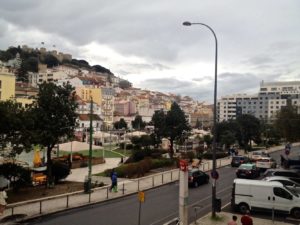 The history of Lisbon and Mouraria – one of the city’s oldest quarters – both originate from the presence of diverse people and cultures. In 1143, Lisbon was conquered from the Moors by King Alfonso Henriques, becoming a Christian city. The birth of Mouraria goes back to the same period, built outside the walls as the only territory where Moors were authorized to reside.
The history of Lisbon and Mouraria – one of the city’s oldest quarters – both originate from the presence of diverse people and cultures. In 1143, Lisbon was conquered from the Moors by King Alfonso Henriques, becoming a Christian city. The birth of Mouraria goes back to the same period, built outside the walls as the only territory where Moors were authorized to reside. In the 16th century, the first black migrants were forced into slavery in Lisbon, in that era the largest European centre of the flourishing slave trade. The number of slaves present in the capital reached 10% of the total population, that time comprising 100,000 inhabitants.
In the 16th century, the first black migrants were forced into slavery in Lisbon, in that era the largest European centre of the flourishing slave trade. The number of slaves present in the capital reached 10% of the total population, that time comprising 100,000 inhabitants. On 25 April 1974, Portugal became a democracy after 48 years of dictatorship. Between April and November 1975, Portugal took in half a million Portuguese and their descendants from its
On 25 April 1974, Portugal became a democracy after 48 years of dictatorship. Between April and November 1975, Portugal took in half a million Portuguese and their descendants from its  Mouraria is the most multicultural neighbourhood of the capital. Here you find everything from African grocers to Chines tea, Indian clothing, religious talismans, Bengali restaurants, mosques and halal butchers. The percentage of foreign residents (25%) is well above the average for the city (10%) and the nation (less 4%).
Mouraria is the most multicultural neighbourhood of the capital. Here you find everything from African grocers to Chines tea, Indian clothing, religious talismans, Bengali restaurants, mosques and halal butchers. The percentage of foreign residents (25%) is well above the average for the city (10%) and the nation (less 4%). In the heart of Mouraria resides the
In the heart of Mouraria resides the  Twenty EU states have golden visa or similar programs.
Twenty EU states have golden visa or similar programs. In the past six years – between October 2012 and January 2019 – over 7000 golden visas have been issued by the Portuguese authorities. In particular to Chinese (> 4000), followed by Brazilians, South Africans, Turks and Russians. It yielded the treasury the sweet amount of 4.3
In the past six years – between October 2012 and January 2019 – over 7000 golden visas have been issued by the Portuguese authorities. In particular to Chinese (> 4000), followed by Brazilians, South Africans, Turks and Russians. It yielded the treasury the sweet amount of 4.3  Just like luxury goods, residence rights are for sale. A multibillion-euro industry but not without risks. Real estate has always and everywhere been attractive to money laundering, corruption and tax evasion.
Just like luxury goods, residence rights are for sale. A multibillion-euro industry but not without risks. Real estate has always and everywhere been attractive to money laundering, corruption and tax evasion. A special commission of the European Parliament suggested
A special commission of the European Parliament suggested  The majority in the Portuguese Parliament even wants to go a step further in the residency scheme for wealthy foreigners by introducing ‘
The majority in the Portuguese Parliament even wants to go a step further in the residency scheme for wealthy foreigners by introducing ‘ In 1543 a Chinese ship with three Portuguese sailors on board – António da Mota, Francisco Zeimoto and António Peixoto – heading for Macau was swept off course and ended up on the Japanese island of Tanegashima. The Japanese were in the middle of civil war and eventually began trading guns with the Portuguese. This way the first trading post in Japan became a fact.
In 1543 a Chinese ship with three Portuguese sailors on board – António da Mota, Francisco Zeimoto and António Peixoto – heading for Macau was swept off course and ended up on the Japanese island of Tanegashima. The Japanese were in the middle of civil war and eventually began trading guns with the Portuguese. This way the first trading post in Japan became a fact. The Portuguese remained in Japan for nearly a century – until
The Portuguese remained in Japan for nearly a century – until  Peixinhos da horta was often eaten during Lent – the 40-day period before Easter that in Christianity is devoted to fasting and abstinence – when the church dictated that Catholics were not allowed to eat meat.
Peixinhos da horta was often eaten during Lent – the 40-day period before Easter that in Christianity is devoted to fasting and abstinence – when the church dictated that Catholics were not allowed to eat meat.
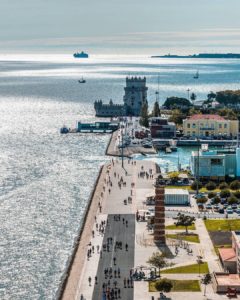 Few destinations have witnessed a boom in tourism like Portugal. According to UN World Tourism Organisation (UNWTO) the country welcomed nearly 7 million international arrivals in 2010. By 2016 that figure had tripled.
Few destinations have witnessed a boom in tourism like Portugal. According to UN World Tourism Organisation (UNWTO) the country welcomed nearly 7 million international arrivals in 2010. By 2016 that figure had tripled. The 10 million visitors to the capital – almost as many as the entire Portuguese population –generated last year almost
The 10 million visitors to the capital – almost as many as the entire Portuguese population –generated last year almost  More than
More than The number of short term rentals –in Portugal registered as alojamento local (AL) – has even overtaken
The number of short term rentals –in Portugal registered as alojamento local (AL) – has even overtaken  Portugal has, in fact, the highest prevalence of stroke in Europe. This is probably due to the high number of people with
Portugal has, in fact, the highest prevalence of stroke in Europe. This is probably due to the high number of people with  A consequence of the widespread existence of stroke and hypertension is the frequent occurrence of dementia.
A consequence of the widespread existence of stroke and hypertension is the frequent occurrence of dementia. Alzheimer is the most common form of dementia in Western Europe. Interesting enough, this is not the case in Portugal. A recent epidemiological study from the University of Porto and
Alzheimer is the most common form of dementia in Western Europe. Interesting enough, this is not the case in Portugal. A recent epidemiological study from the University of Porto and 
 Portugal’s oldest tree – 3350 years old – can be admired in Mouriscas, the municipality of Abrantes. As one of the oldest trees in the world, it has provided shadow to innumerous people, from Celts to Romans and from Visigoths to Arabs. This monumental olive tree is not only a contemporary from pharaoh Ramses II and Moses (1250 years B.C) but also from you and me.
Portugal’s oldest tree – 3350 years old – can be admired in Mouriscas, the municipality of Abrantes. As one of the oldest trees in the world, it has provided shadow to innumerous people, from Celts to Romans and from Visigoths to Arabs. This monumental olive tree is not only a contemporary from pharaoh Ramses II and Moses (1250 years B.C) but also from you and me. Another recent breakthrough in the green world has been the unraveling by Portuguese scientists of the
Another recent breakthrough in the green world has been the unraveling by Portuguese scientists of the  It was on the 21st of March last year that the 234- year- old cork oak from Águas de Moura, a small village in the district of Palmela, was declared ‘
It was on the 21st of March last year that the 234- year- old cork oak from Águas de Moura, a small village in the district of Palmela, was declared ‘ The Portuguese entry for this year’s event – since 2011 organized by the Environmental Partnership Organisation (EPA) in which 15 European countries participate – is once again an oak. This time the 150- year-old
The Portuguese entry for this year’s event – since 2011 organized by the Environmental Partnership Organisation (EPA) in which 15 European countries participate – is once again an oak. This time the 150- year-old  Once again
Once again  The next day around 300 black youngsters held a spontaneous demonstration at the prestigious Avenida da Liberdade, chanting ‘Stop racist police brutality’.
The next day around 300 black youngsters held a spontaneous demonstration at the prestigious Avenida da Liberdade, chanting ‘Stop racist police brutality’. Slums proliferated in Portugal from the 1970s onward due to
Slums proliferated in Portugal from the 1970s onward due to  This story of police brutality reminds of the well-known case from February 2015, when 17 policemen were accused of a number of crimes against a group of black young people in Lisbon’s quarter
This story of police brutality reminds of the well-known case from February 2015, when 17 policemen were accused of a number of crimes against a group of black young people in Lisbon’s quarter 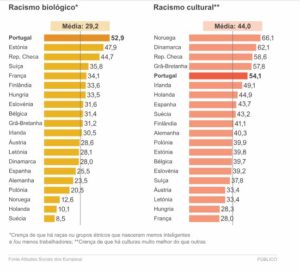 The UN Committee on the Elimination of Racial Discrimination has repeatedly declared being very concerned with racism in Portugal and the lack of measures taken for the benefit of the
The UN Committee on the Elimination of Racial Discrimination has repeatedly declared being very concerned with racism in Portugal and the lack of measures taken for the benefit of the  The introduction of sugar cane farming by the Portuguese into Madeira towards the first half of the 15th century – some decades before Columbus discovered America – meant that sugar could be exported, at first through Lisbon and then directly to the ports of Flanders (Antwerp and Bruges). In this way the consumption of the ‘white gold’ spread across the whole of Europe, altering people’s eating habits.
The introduction of sugar cane farming by the Portuguese into Madeira towards the first half of the 15th century – some decades before Columbus discovered America – meant that sugar could be exported, at first through Lisbon and then directly to the ports of Flanders (Antwerp and Bruges). In this way the consumption of the ‘white gold’ spread across the whole of Europe, altering people’s eating habits. Although the archipelago of Madeira – geographically isolated in the middle of the Atlantic Ocean – had already been shown on earlier maps, it was only in 1418 that the first Portuguese navigators landed on the island of Porto Santo and subsequently discovered the much bigger island, Madeira.
Although the archipelago of Madeira – geographically isolated in the middle of the Atlantic Ocean – had already been shown on earlier maps, it was only in 1418 that the first Portuguese navigators landed on the island of Porto Santo and subsequently discovered the much bigger island, Madeira. The newly introduced sugar-based economy called for important innovations such as ‘sugar mills’ and ‘grinding stones’, together with the use of special moulds that gave rise to the famous ‘sugarloaves’, the form in which refined sugar was produced and sold until granulated and cube sugars were introduced in the late 19th century. A tall cone with a rounded top was the end-product. The larger the loaf the lower the grade of sugar. A common size that time was 6.4 kg but the finest sugar from Madeira came in small loaves of only 1.4 to 1.8 kg.
The newly introduced sugar-based economy called for important innovations such as ‘sugar mills’ and ‘grinding stones’, together with the use of special moulds that gave rise to the famous ‘sugarloaves’, the form in which refined sugar was produced and sold until granulated and cube sugars were introduced in the late 19th century. A tall cone with a rounded top was the end-product. The larger the loaf the lower the grade of sugar. A common size that time was 6.4 kg but the finest sugar from Madeira came in small loaves of only 1.4 to 1.8 kg.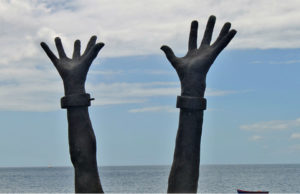 From the very beginning of its origins in Madeira, production completely relied on the use of slave labour. Captives were taken along the coast of North and West Africa and brought to work at the sugar mills. When the sugar production in the much vaster territory of Brazil got underway in the 16th century, Madeira lost its privileged position. Sugar from South America was simply cheaper.
From the very beginning of its origins in Madeira, production completely relied on the use of slave labour. Captives were taken along the coast of North and West Africa and brought to work at the sugar mills. When the sugar production in the much vaster territory of Brazil got underway in the 16th century, Madeira lost its privileged position. Sugar from South America was simply cheaper. Sugarloaf mountain (
Sugarloaf mountain (